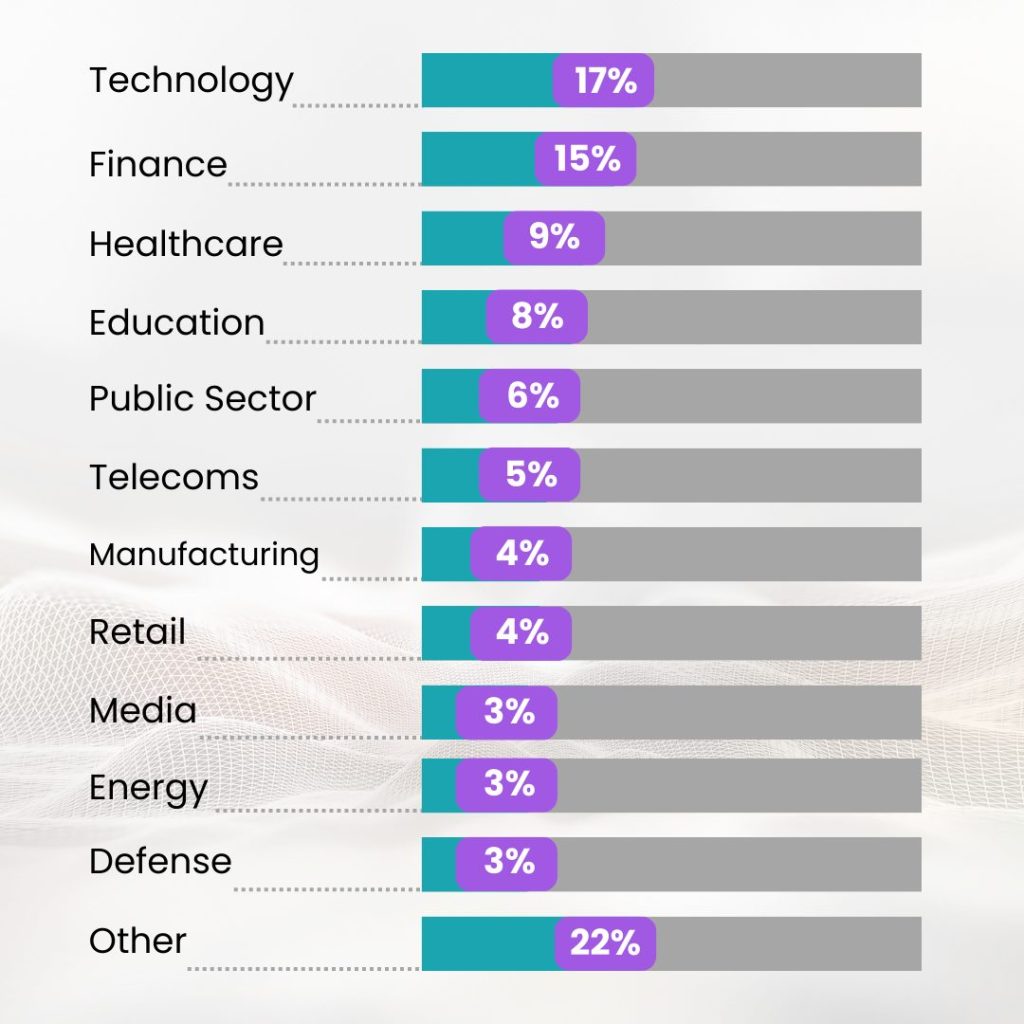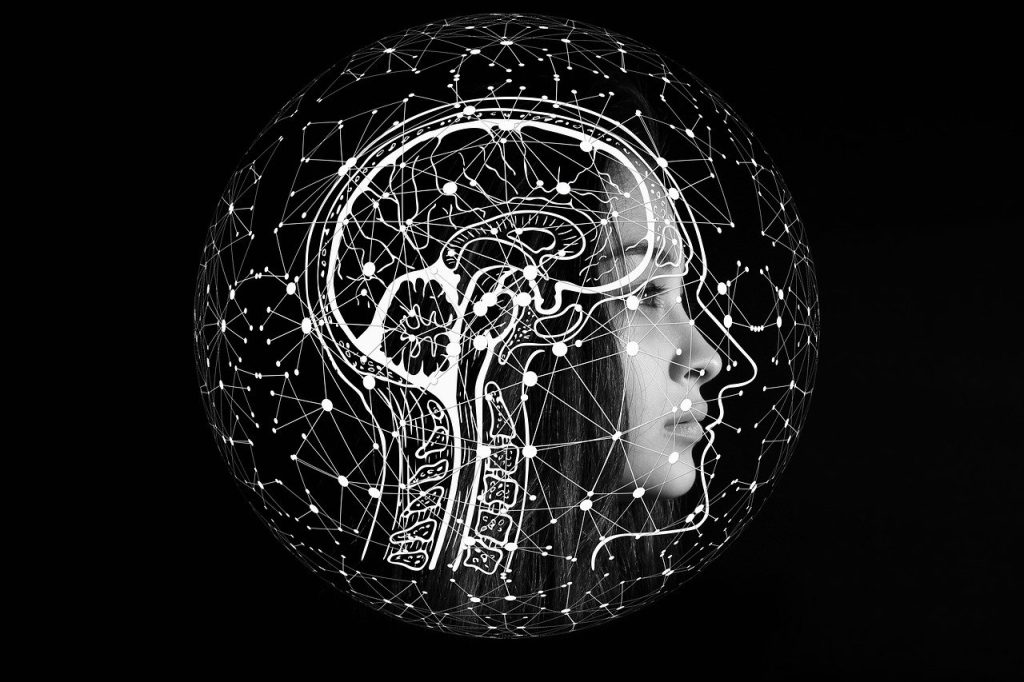Artificial Intelligence (AI) has been in the news recently thanks to the amazing capabilities (and popularity) of ChatGPT, as well as fears about whether AI will take our jobs or destroy the world. In all of this discussion, some people may have wondered how we can use AI apart from cheating at homework and generating amusing images of Elvis on the moon in the style of Van Gogh.
AI was already worth $62bn in 2020 and is predicted to grow 40% by 2028 according to Grand View Research. Meanwhile, data from O’Reilly notes that many industries are already using AI:

The common benefits of AI tend to be summarized as automation and speed, but what do these mean in practice? Let’s look at how AI can benefit your business.
Content creation
We know that ChatGPT and many other AIs can generate text based on specific prompts. You can use this to generate blog posts much more rapidly than a human writer and also in multiple languages if your customer base is international. You can also adjust this text for tone (formal or informal) and even subject (travel guide, motivational coach).
Copywriters will argue that AI still has limitations in texts of 500 words or more. Others say that machine-created language , though grammatically correct, can be quite dull to read. It doesn’t have the range of personality or expression that a person has. However, AI is excellent for short texts such as ad copy or social media posts.
We know that ChatGPT and many other AIs can generate text based on specific prompts. You can use this to generate blog posts much more rapidly than a human writer and also in multiple languages if your customer base is international. You can also adjust the copy for tone (formal or informal) and even subject (travel guide, motivational coach).
Copywriters will argue that AI still has limitations in texts of 500 words or more. Others say that language created by machines, though grammatically correct, can be quite dull to read. It doesn’t have the range of personality or expression that a person has. However, AI is excellent for short texts such as ad copy or social media posts.
Time saving
Generating copy with limited word counts and specific vocabulary or SEO requirements can take an organization many hours. It’s also very boring and repetitive, which can provoke human error. AI can produce this kind of content in minutes. It may need to be checked by a person, but the organization saves many hours that skilled content creators can spend on tasks that require real creativity.
Businesses can also use AI to create visual content. We all know how long it takes to search through (and often pay for) images to support written content. With AI image generation, you can not only create artistic composite visuals but photographs that are largely indistinguishable from those taken by actual photographers. It’s very quick and potentially a cheaper option that also allows you to find exactly the right image.
Of course, there’s some controversy around AI content creation. If the technology can create copy and images in seconds, how will this affect copywriters and designers long term? AI also uses pre-existing material created by humans to produce its content – essentially plagiarizing work without payment.
AI in data processing
Perhaps the most useful function of AI is its ability to look through huge amounts of data in moments – something that humans will never be able to do as quickly or as accurately. The benefits are vast for different sectors and departments. Let’s look at a few.
Sales
Harvard Business Review has said that AI can increase leads by 50% and reduce call times by 60-70%. How? For example, AI can track, record, categorize and file customer email responses to prioritize and sort the best leads for human sales staff. It can even send a variety of customized responses to customers based on key words and phrases identified in the communications.
AI can also forecast long-term demand and predict customer behavior based on previous sales figures and first-party data. This same data allows AIs to make customer recommendations based on purchase activity and inform customers of relevant offers automatically.
Customer support
You may not know whether all of your customers are happy all the time. AI can help by monitoring and scanning customer communications to search for keywords or phrases such as “refund,” “complain,” or “never again.” This way, you can respond quickly to unhappy customers and avoid losing them while following customers who could become brand ambassadors.
Chatbots are another way to be available 24/7 for customer problems or enquiries. Don’t be fooled by the first generation of chatbots whose mechanical and nonsensical replies frustrated customers. AIs such as Microsoft’s DialoGPT has been trained on 147m multi-turn conversations from Reddit threads and can talk like a real person.
Increasingly, AIs are able to offer sophisticated voice communication and we may not be very far from AI-riven call centers, saving businesses huge amounts in recruitment and management.

Marketing
As in sales, AI data-processing tools can help segment audiences for better and more accurate message targeting. We know that sending the same communication to a mass audience is inefficient, and also that microscopic levels of differentiation are time-consuming. AI can not only create bespoke content but also send it and reply to customers.
Competitor analysis is another time-consuming and constant task, especially if monitoring multiple social media accounts and website updates. AI can follow competitor activity such as tweets and categorize them by topic or key word so you can see changing trends in their activity. You can then check if these patterns are being replicated more widely online and capitalize on them.
We noted above that AI can write SEO-targeted copy, but you can also use it to keep an eye on the popularity or frequency of keywords. This could help you to minimize your spend, modify your copy and boost your organic content.
Human resources
You know that feeling when you have 457 applications for one job posting? More than 400 of them will be a waste of your time, but you still have to look through them for hours or days. Or do you? AI will analyze applications according to key phrases and sort them for priority viewing. It can also check people out on LinkedIn and scan their job profiles for relevant experience. Don’t want to employ someone who prefers dogs to cats? Set that as a priority filter! (Do NOT do this. It is probably illegal.)
Finance
As seen in the above statistics, finance is one of the main early adopters of AI for one obvious reason: the industry generates colossal amounts of ever-changing and business-critical data. With millions of customers making multiple transactions daily, how do you identify fraud, for example?
AI in Research
AI is trained to recognize tell-tale patterns and automatically stop suspicious activity, creating reports and even alerting customers about incidents. Such 24/7 monitoring can save financial institutions millions in lost funds while also maintaining good relationships
Many people assume that an Internet search is AI in action, but this is not necessarily the case. Microsoft’s Bing uses a search engine based on OpenAI’s large language model (more powerful than ChatGPT) and can accept search queries of up to 1000 words for highly specific results.
Still, it’s relatively labor-intensive to go through search results. The benefit of AI is that it can read everything online (depending on its scope) and produce detailed written feedback so you don’t have to sort through the results. Some AI’s such as Elicit will read through banks of specific studies and provide summaries of each one so you know which ones to look at in more detail.
Efficiency
All of these use cases offer efficiency through saved time, but AI is also being applied to streamline your working day. Tired of staying alert in a long Friday virtual meeting? AI tools Cogram and Otter will listen and take notes for you. The latter will additionally record audio and capture slides so you can recap on Monday morning.
AI is already here and working in multiple sectors. Those who use it are receiving the advantages of faster work, greater accuracy, better targeting and automation that frees skilled people to do the things that humans still do best . . . At least until next year.










